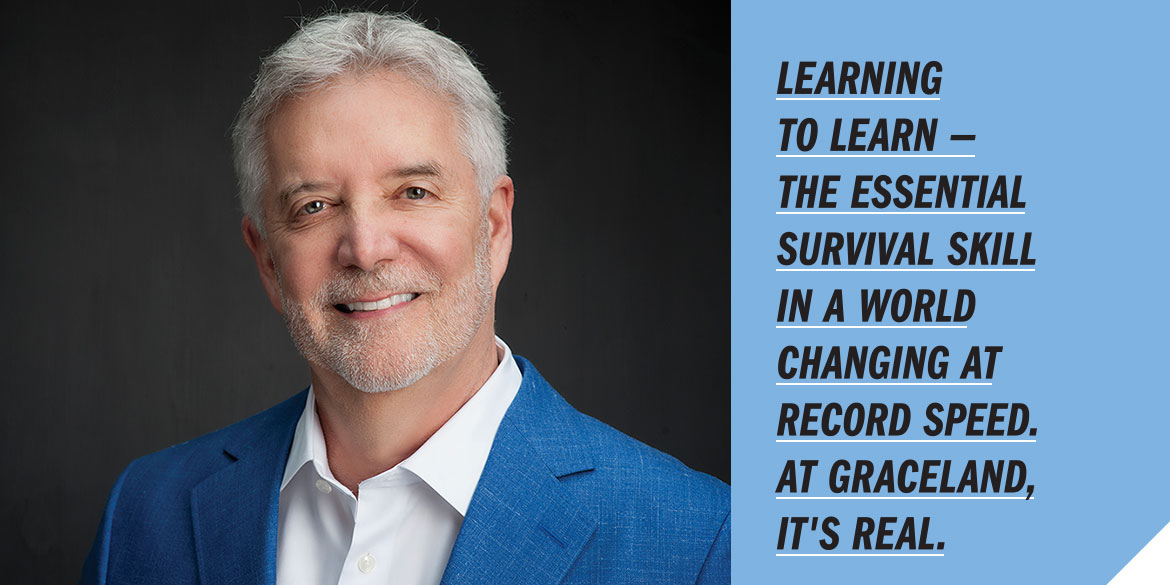Learning to learn — the essential survival skill in a world changing at record speed. At Graceland, it’s real.
When I unpacked my suitcase as a Graceland freshman in the fall of 1966, I assumed I was there to acquire a body of knowledge that I could efficiently apply daily in my personal and professional life for the rest of my life. That year, I came to realize I was there to learn how to learn.

When I unpacked my suitcase as a Graceland freshman in the fall of 1966, I assumed I was there to acquire a body of knowledge that I could efficiently apply daily in my personal and professional life for the rest of my life. That year, I came to realize I was there to learn how to learn.
Slowly, and sometimes even surprising myself, I began to develop the tools, sometimes with frustration, but sometimes with exhilaration, to constructively critique the world. In classes, in assigned readings, in research and discussion with friends, I began to rethink some of my assumptions about the world in which I lived and the world beyond my immediate experience. Sometimes without knowing it, I was making progress in solving problems and making better decisions.
The Graceland community of learning was teaching me how to think, how to evaluate all of my life assumptions and how
to engage the world with a sense of wonderment and openness. I came to understand that the ultimate goal of education was not to pile up an encyclopedia of facts in my brain.
The world changes, and many of those facts could soon be obsolete. But if I could learn how to continue to learn, to think critically yet constructively, I could survive. I could adapt — make better decisions and be successful in whatever I chose to do in my life.
Today, Graceland is even more intentional in its goal of teaching students how to think. The university has created a freshman seminar for virtually all incoming students that places them in a learning community of around 15 colleagues. Faculties from across the academic disciplines model critical thinking skills that can be applied to any subject. As the classes evolve from random groups to supportive learning communities and students develop friendships with those from different lifestyles and backgrounds, they listen to new ideas and develop the confidence to revisit past assumptions. Yes, it can be scary, but to discover new windows on the universe — not how much we know, but how much we don’t know — that’s what a good education can provide.
As an employer in my professional years, I searched for employees who could comprehensively evaluate information, consider alternatives and arrive at good decisions through constructive dialogue and teamwork. Through collaboration and creativity, the Graceland faculty have implemented a new curriculum that makes critical thinking a primary goal. Do freshmen find it threatening? Often. Do they feel supported by competent and caring instructors? Almost always. Do seniors appreciate the intellectual journey and look back on their Graceland days as a time of rewarding personal growth? Almost always. Learning to learn, the essential survival skill in a world changing at record speed — at Graceland, it’s real.
Harry Ashenhurst
Chair, Board of Trustees
Horizons - Summer 2018
June 15, 2018
Dr. Jill Rhea was hired as Vice President for Academic Affairs and Dean of Faculty effective July 1 following a national search assisted by the Association of Governing Boards of Universities and Colleges (AGB). She comes to Graceland with experience in both traditional liberal arts undergraduate education and in overseeing online, adult on-site and graduate programs.
Horizons - Summer 2018
June 15, 2018
After asking students, alumni, faculty and staff what they would choose as their Graceland top 10, we pooled their answers to bring you this list of inspiring attributes that make Graceland the place we are all proud to call home.
Horizons - Summer 2018
June 15, 2018
It’s no secret that Graceland faculty are a focused bunch.
Their achievements are piling up, and the faculty bulletin boasts entries weekly. Graceland professors are not only excellent teachers, their scholarship is admirable. They’re keeping up with the cutting edge of their disciplines and bettering themselves to provide Graceland students with the opportunities and knowledge they need to succeed.
Horizons - Summer 2018
June 15, 2018
Over the past two years, members of the Graceland community have teamed up with the Kansas City Chiefs to raise funds to build a middle school in the village of Palo Blanco, Guatemala, and another in La Majada, Guatemala.
Horizons - Summer 2018
June 15, 2018
Commencement provides an opportunity to give recognition for outstanding accomplishments in the Graceland community.
Horizons - Summer 2018
June 15, 2018
We applaud many things at Graceland, but the crowning achievement is learning. Scholarship is the most important task of the university, and academic accomplishment is what we celebrate at commencement.